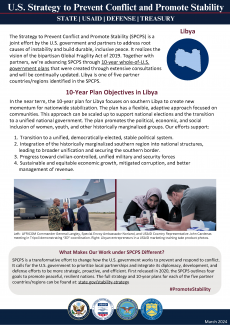The Strategy to Prevent Conflict and Promote Stability (SPCPS) is a joint effort by the U.S. government and partners to address root causes of instability and build durable, inclusive peace. It realizes the vision of the bipartisan Global Fragility Act of 2019. Together with partners, we’re advancing SPCPS through 10-year whole-of-U.S. government plans that were created through extensive consultations and will be continually updated. Libya is one of five partner countries/regions identified in the SPCPS.
10-Year Plan Objectives in Libya
In the near term, the 10-year plan for Libya focuses on southern Libya to create new momentum for nationwide stabilization. The plan has a flexible, adaptive approach focused on communities. This approach can be scaled up to support national elections and the transition to a unified national government. The plan promotes the political, economic, and social inclusion of women, youth, and other historically marginalized groups. Our efforts support:
- Transition to a unified, democratically-elected, stable political system.
- Integration of the historically marginalized southern region into national structures, leading to broader unification and securing the southern border.
- Progress toward civilian-controlled, unified military and security forces.
- Sustainable and equitable economic growth, mitigated corruption, and better management of revenue.
SPCPS Activities in Libya
To advance the SPCPS in Libya, the United States, led by State, USAID, Defense, and Treasury, is leveraging resources from across the U.S. government. This includes both activities supported by the Prevention and Stabilization Fund, which was authorized by the U.S. Congress for SPCPS, and other U.S. government programs aligned to the 10-year plans, such as:
- Disarmament, Demobilization, and Reintegration (State Department, previously USAID): Laying the groundwork for Libyan-led disarmament, demobilization, and reintegration efforts, identifying and supporting local actors, and empowering communities to counter militias through local activism and community organizing.
- Inclusive Local Governance in Libya’s South (USAID): Empowering citizens and local governments by decentralizing public services after years of neglect by promoting community bonds, citizen-municipal engagement, and effective use of public resources.
- Libya Economic Acceleration Program (USAID): Enhancing economic opportunities in Libya’s marginalized south by strengthening entrepreneurship skills through tailored, firm-level assistance to micro, small, and medium enterprises to enhance productivity, increase employment, and expand prosperity.
- Multi-Donor Reconstruction Fund for Murzuq (USAID): Building on the U.S.-coordinated peace agreement for Murzuq, this U.S.-led partnership is creating systems for the transparent, accountable, and inclusive planning of reconstruction activities to create the conditions for safe, voluntary, and dignified returns of internally displaced persons.
- Transitional Justice and Reconciliation (State Department and USAID): A joint effort empowering citizens, communities, and inclusive civil society organizations to engage in reconciliation initiatives and transitional justice processes to build a unified Libya.

